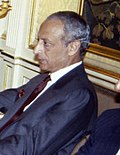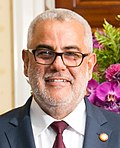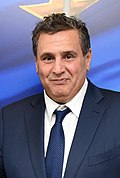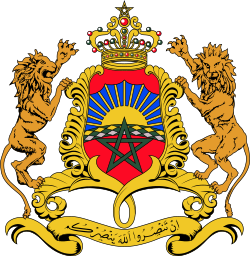| No. | Portrait | Name
(Birth–Death) | Term of office | Party | Legislature
(Election) | Cabinet | King
(Reign) |
|---|
| Took office | Left office | Time in office |
|---|
| 1 |  | Mbarek Bekkay
مبارك البكاي
(1907–1961)
[a] | 7 December 1955 | 12 May 1958 | 2 years, 156 days | | Independent | None | Bekkay I [ fr ] | Mohammed V
محمد الخامس

(1955–1961) |
|---|
| Bekkay II [ fr ] |
| 2 |  | Ahmed Balafrej
أحمد بلافريج
(1908–1990) | 12 May 1958 | 16 December 1958 | 218 days | | Istiqlal Party | Balafrej [ fr ] |
|---|
| 3 |  | Abdallah Ibrahim
عبد الله إبراهيم
(1918–2005) | 16 December 1958 | 20 May 1960 | 1 year, 156 days | | Istiqlal Party | Ibrahim [ fr ] |
|---|
| — |  | Position vacant
(Direct rule by
Mohammed V) | 20 May 1960 | 26 February 1961
(Died in office) | 282 days | | Independent | Mohammed [ fr ] |
|---|
| — |  | Position vacant
(Direct rule by
Hassan II) | 26 February 1961 | 13 November 1963 | 2 years, 260 days | | Independent | Hassan I [ fr ] | Hassan II
الحسن الثاني

(1961–1999) |
|---|
| Hassan II [ fr ] |
| Hassan III [ fr ] |
| 4 |  | Ahmed Bahnini
أحمد بحنيني
(1909–1971) | 13 November 1963 | 7 June 1965 | 1 year, 206 days | | Front for the Defence of Constitutional Institutions | I (1963) | Bahnini [ fr ] |
|---|
| — |  | Position vacant
(Direct rule by
Hassan II) | 7 June 1965 | 7 July 1967 | 2 years, 30 days | | Independent | Hassan IV [ fr ] |
|---|
| 5 |  | Mohamed Benhima
محمد بنهيمة
(1924–1992) | 7 July 1967 | 7 October 1969 | 2 years, 92 days | | Front for the Defence of Constitutional Institutions | Benhima/Laraki [ fr ] |
|---|
| 6 |  | Ahmed Laraki
أحمد العراقي
(1931–2020) | 7 October 1969 | 6 August 1971 | 1 year, 303 days | | Istiqlal Party | Benhima/Laraki [ fr ] |
|---|
| 7 |  | Mohammed Karim Lamrani
محمد كريم العمراني
(1919–2018) | 6 August 1971 | 2 November 1972 | 1 year, 88 days | | Independent | II (1970) | Lamrani I [ fr ] |
|---|
| Lamrani II [ fr ] |
| 8 |  | Ahmed Osman
أحمد عصمان
(born 1930) | 2 November 1972 | 22 March 1979 | 6 years, 140 days | | National Rally of Independents | Osman I [ fr ] |
|---|
| III (1977) | Osman II [ fr ] |
| 9 |  | Maati Bouabid
المعطي بوعبيد
(1927–1996) | 22 March 1979 | 30 November 1983 | 4 years, 253 days | | Constitutional Union | Bouabid I [ fr ] |
|---|
| Bouabid II [ fr ] |
| (7) |  | Mohammed Karim Lamrani
محمد كريم العمراني
(1919–2018) | 30 November 1983 | 30 September 1986 | 2 years, 304 days | | Independent | Lamrani III [ fr ] |
|---|
| IV (1984) | Lamrani IV [ fr ] |
| 10 |  | Azzeddine Laraki
عز الدين العراقي
(1929–2010) | 30 September 1986 | 11 August 1992 | 5 years, 316 days | | Independent | Laraki II [ fr ] |
|---|
| (7) |  | Mohammed Karim Lamrani
محمد كريم العمراني
(1919–2018) | 11 August 1992 | 25 May 1994 | 1 year, 287 days | | Independent | Lamrani V [ fr ] |
|---|
| V (1993) | Lamrani VI [ fr ] |
| 11 |  | Abdellatif Filali
عبد اللطيف الفيلالي
(1928–2009) | 25 May 1994 | 4 February 1998 | 3 years, 255 days | | Independent | Filali I [ fr ] |
|---|
| Filali II [ fr ] |
| VI (1997) | Filali III [ fr ] |
| 12 |  | Abderrahmane Youssoufi
عبد الرحمن اليوسفي
(1924–2020) | 4 February 1998 | 9 October 2002 | 4 years, 247 days | | Socialist Union of Popular Forces | Youssoufi I [ fr ] |
|---|
| Youssoufi II [ fr ] | Mohammed VI
محمد السادس

(1999–present) |
| 13 |  | Driss Jettou
إدريس جطو
(born 1945) | 9 October 2002 | 19 September 2007 | 4 years, 345 days | | Independent | VII (2002) | Jettou I [ fr ] |
|---|
| Jettou II [ fr ] |
| 14 |  | Abbas El Fassi
عباس الفاسي
(born 1940) | 19 September 2007 | 29 November 2011 | 4 years, 71 days | | Istiqlal Party | VIII (2007) | El Fassi [ fr ] |
|---|
| 15 |  | Abdelilah Benkirane
عبد الإله ابن كيران
(born 1954) | 29 November 2011 | 5 April 2017 | 5 years, 127 days | | Justice and Development Party | IX (2011) | Benkiran I [ fr ] |
|---|
| Benkiran II [ fr ] |
| 16 |  | Saadeddine Othmani
سعد الدين العثماني
(born 1956) | 5 April 2017 | 7 October 2021 | 4 years, 185 days | | Justice and Development Party | X (2016) | Othmani I [ fr ] |
|---|
| Othmani II [ fr ] |
| 17 |  | Aziz Akhannouch
عزيز أخنوش
(born 1961) | 7 October 2021 | Incumbent | 4 years, 102 days | | National Rally of Independents | XI (2021) | Akhannouch I [ fr ] |
|---|
| Akhannouch II [ fr ] |






















